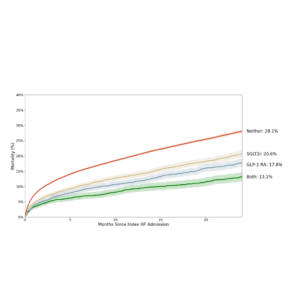egnite, Inc. Announces Research from its Real-World Database at Heart Rhythm 2023
Study Led by John Mignone, M.D., Ph.D., Presented at the Heart Rhythm Society’s Annual Meeting
Key Findings Demonstrate Increased Survival for Patients Receiving Combined Device and 4-Class Medical Therapy
ALISO VIEJO, Calif. – May 21, 2023 – egnite, Inc., a leading digital health company for cardiovascular care, announces today the release of novel research presented at Heart Rhythm 2023. Led by heart failure cardiologist John Mignone, the study utilized real-world data from egnite’s de-identified database of over 5.2 million cardiovascular patients from 20 leading heart programs across the United States.
“Over the last five years, new therapies to treat heart failure emerged with promising improvements in survival benefit. This study represents the first time we’ve seen an assessment of ‘5-class’ guideline-directed therapy — up to 4 foundational medication classes plus ICD/CRT-D therapy — for these patients,” John Mignone, MD, Ph.D., Robert M. and Patricia Arnold Endowed Medical Director for Heart Failure and Co-Executive Medical Director Swedish Heart and Vascular Institute. “The next big challenge to overcome is implementing care at a time of growing disease burden and fewer clinical resources. Artificial intelligence powered insights, like those provided by egnite, will enable us to ensure appropriate care is provided to our entire patient population.”
The study assessed 18-month survival for patients with heart failure with reduced ejection fraction (HFrEF) and a left ventricular ejection fraction of ≤35% who received guideline-directed medical therapy (GDMT) with or without an implantable cardioverter-defibrillator/cardiac resynchronization therapy-defibrillator (ICD/CRT-D) device.
Key findings from the study are as follows:
- Significant variability exists in guideline-directed care for patients with HFrEF, with just 8% having all 4 classes of GDMT prescribed at 18-months
- 24% survival benefit associated with treatment with all 4 classes of GDMT (versus none)
- Up to 7% survival benefit associated with device placement in addition to GDMT
These findings underscore the significance of combined GDMT and device therapy, indicating even greater survival rates among critically ill heart failure patients and the need to standardize care to improve the health of our communities.
About egnite, Inc.
egnite is a visionary digital health company committed to advancing the health of our society through innovative cardiovascular solutions. egnite uses AI-driven algorithms and big data to produce business intelligence for healthcare, elevating the role of data in critical decisions. The company partners with leading hospitals and life sciences organizations to transform care delivery for cardiovascular patients. The company is based in Aliso Viejo, Calif., for more information, visit www.egnitehealth.com.



